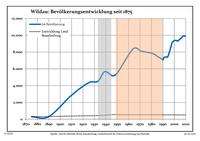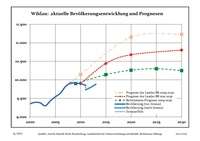Wildau
| Wildau | ||
|---|---|---|
| ||
 Wildau | ||
Location of Wildau within Dahme-Spreewald district  | ||
| Coordinates: 52°19′N 13°38′E / 52.317°N 13.633°ECoordinates: 52°19′N 13°38′E / 52.317°N 13.633°E | ||
| Country | Germany | |
| State | Brandenburg | |
| District | Dahme-Spreewald | |
| Government | ||
| • Mayor | Dr. Uwe Malich (Die Linke) | |
| Area | ||
| • Total | 9.09 km2 (3.51 sq mi) | |
| Population (2013-12-31)[1] | ||
| • Total | 9,878 | |
| • Density | 1,100/km2 (2,800/sq mi) | |
| Time zone | CET/CEST (UTC+1/+2) | |
| Postal codes | 15745 | |
| Dialling codes | 03375 | |
| Vehicle registration | LDS | |
| Website | www.wildau.de | |
Wildau is a German municipality of the state of Brandenburg, located in the district of Dahme-Spreewald. It is located close to Berlin and easily reached by the S-Bahn. As of 2006 its population was of 9,649 inhabitants.
History

The history of Wildau began with fisherman's families that settled by the Dahme River and then came to deliver sand, gravel and bricks from the region by boat to Berlin.
Mechanical engineering put Wildau on the map as a location for industry. In 1897, the company Schwartzkopff GmbH established a locomotive factory here, and built housing for the factory workers that is today is under cultural heritage management. During the Second World War, local factories were involved in armaments production. After the war, they became East Germany's state enterprise in heavy engineering. After German unification, the factories were mostly shut down by the Treuhand.

In the region around Wildau, numerous technology and business parks have been set up in recent years, with service industries, logistics centers, as well as energy and environmental technology companies. In the region there is a beautiful mall by name of A10. An engineering school founded in 1949, was an integral part of mechanical engineering in the region before 1990. In 1991 the federal state of Brandenburg founded the Technical University of Applied Sciences Wildau. In 2013 Wildau acquired the title of city and now is one of 113 other such small cities in Brandenburg.
Demography
-

Development of Population since 1875 within the Current Boundaries (Blue Line: Population; Dotted Line: Comparison to Population Development of Brandenburg state; Grey Background: Time of Nazi rule; Red Background: Time of Communist rule)
-

Recent Population Development (Blue Line) and Forecasts
|
|
|
|
Detailed data sources are to be found in the Wikimedia Commons.[3]
References
- ↑ "Bevölkerung im Land Brandenburg nach amtsfreien Gemeinden, Ämtern und Gemeinden 31. Dezember 2013 (Fortgeschriebene amtliche Einwohnerzahlen auf Grundlage des Zensus 2011)". Amt für Statistik Berlin-Brandenburg (in German). 2014.
- ↑ Boundaries as of 2013
- ↑ Population Projection Brandenburg at Wikimedia Commons
External links
|
